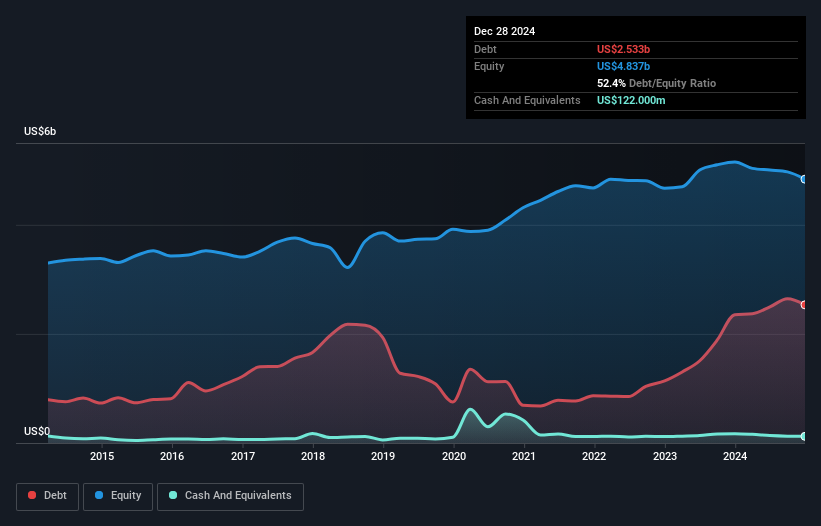- United States
- /
- Healthcare Services
- /
- NasdaqGS:HSIC
We Think Henry Schein (NASDAQ:HSIC) Can Stay On Top Of Its Debt

The external fund manager backed by Berkshire Hathaway's Charlie Munger, Li Lu, makes no bones about it when he says 'The biggest investment risk is not the volatility of prices, but whether you will suffer a permanent loss of capital.' It's only natural to consider a company's balance sheet when you examine how risky it is, since debt is often involved when a business collapses. We note that Henry Schein, Inc. (NASDAQ:HSIC) does have debt on its balance sheet. But the more important question is: how much risk is that debt creating?
When Is Debt Dangerous?
Debt assists a business until the business has trouble paying it off, either with new capital or with free cash flow. Ultimately, if the company can't fulfill its legal obligations to repay debt, shareholders could walk away with nothing. However, a more frequent (but still costly) occurrence is where a company must issue shares at bargain-basement prices, permanently diluting shareholders, just to shore up its balance sheet. By replacing dilution, though, debt can be an extremely good tool for businesses that need capital to invest in growth at high rates of return. The first step when considering a company's debt levels is to consider its cash and debt together.
How Much Debt Does Henry Schein Carry?
As you can see below, at the end of December 2024, Henry Schein had US$2.53b of debt, up from US$2.35b a year ago. Click the image for more detail. However, it also had US$122.0m in cash, and so its net debt is US$2.41b.

How Strong Is Henry Schein's Balance Sheet?
Zooming in on the latest balance sheet data, we can see that Henry Schein had liabilities of US$2.80b due within 12 months and liabilities of US$2.58b due beyond that. Offsetting these obligations, it had cash of US$122.0m as well as receivables valued at US$1.48b due within 12 months. So its liabilities total US$3.78b more than the combination of its cash and short-term receivables.
While this might seem like a lot, it is not so bad since Henry Schein has a market capitalization of US$8.66b, and so it could probably strengthen its balance sheet by raising capital if it needed to. But it's clear that we should definitely closely examine whether it can manage its debt without dilution.
Check out our latest analysis for Henry Schein
We use two main ratios to inform us about debt levels relative to earnings. The first is net debt divided by earnings before interest, tax, depreciation, and amortization (EBITDA), while the second is how many times its earnings before interest and tax (EBIT) covers its interest expense (or its interest cover, for short). This way, we consider both the absolute quantum of the debt, as well as the interest rates paid on it.
Henry Schein has net debt worth 2.4 times EBITDA, which isn't too much, but its interest cover looks a bit on the low side, with EBIT at only 7.0 times the interest expense. While these numbers do not alarm us, it's worth noting that the cost of the company's debt is having a real impact. Henry Schein grew its EBIT by 2.1% in the last year. That's far from incredible but it is a good thing, when it comes to paying off debt. The balance sheet is clearly the area to focus on when you are analysing debt. But it is future earnings, more than anything, that will determine Henry Schein's ability to maintain a healthy balance sheet going forward. So if you're focused on the future you can check out this free report showing analyst profit forecasts.
Finally, while the tax-man may adore accounting profits, lenders only accept cold hard cash. So the logical step is to look at the proportion of that EBIT that is matched by actual free cash flow. Over the most recent three years, Henry Schein recorded free cash flow worth 62% of its EBIT, which is around normal, given free cash flow excludes interest and tax. This cold hard cash means it can reduce its debt when it wants to.
Our View
Henry Schein's conversion of EBIT to free cash flow was a real positive on this analysis, as was its interest cover. On the other hand, its level of total liabilities makes us a little less comfortable about its debt. It's also worth noting that Henry Schein is in the Healthcare industry, which is often considered to be quite defensive. When we consider all the elements mentioned above, it seems to us that Henry Schein is managing its debt quite well. But a word of caution: we think debt levels are high enough to justify ongoing monitoring. The balance sheet is clearly the area to focus on when you are analysing debt. But ultimately, every company can contain risks that exist outside of the balance sheet. To that end, you should be aware of the 2 warning signs we've spotted with Henry Schein .
If you're interested in investing in businesses that can grow profits without the burden of debt, then check out this free list of growing businesses that have net cash on the balance sheet.
Valuation is complex, but we're here to simplify it.
Discover if Henry Schein might be undervalued or overvalued with our detailed analysis, featuring fair value estimates, potential risks, dividends, insider trades, and its financial condition.
Access Free AnalysisHave feedback on this article? Concerned about the content? Get in touch with us directly. Alternatively, email editorial-team (at) simplywallst.com.
This article by Simply Wall St is general in nature. We provide commentary based on historical data and analyst forecasts only using an unbiased methodology and our articles are not intended to be financial advice. It does not constitute a recommendation to buy or sell any stock, and does not take account of your objectives, or your financial situation. We aim to bring you long-term focused analysis driven by fundamental data. Note that our analysis may not factor in the latest price-sensitive company announcements or qualitative material. Simply Wall St has no position in any stocks mentioned.
About NasdaqGS:HSIC
Henry Schein
Provides health care products and services to office-based dental and medical practitioners, and alternate sites of care worldwide.
Undervalued with adequate balance sheet.
Similar Companies
Market Insights
Community Narratives



